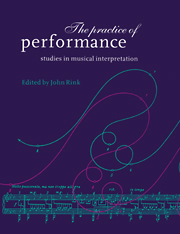Book contents
- Frontmatter
- Contents
- Preface
- PART ONE FUNDAMENTALS
- PART TWO STRUCTURE AND MEANING IN PERFORMANCE
- 5 The conductor and the theorist: Furtwängler, Schenker and the first movement of Beethoven's Ninth Symphony
- 6 A curious moment in Schumann's Fourth Symphony: structure as the fusion of affect and intuition
- 7 Beginning–ending ambiguity: consequences of performance choices
- 8 Strategies of irony in Prokofiev's Violin Sonata in F minor Op. 80
- PART THREE PERFORMANCE AS PROCESS
- Index
7 - Beginning–ending ambiguity: consequences of performance choices
Published online by Cambridge University Press: 10 October 2009
- Frontmatter
- Contents
- Preface
- PART ONE FUNDAMENTALS
- PART TWO STRUCTURE AND MEANING IN PERFORMANCE
- 5 The conductor and the theorist: Furtwängler, Schenker and the first movement of Beethoven's Ninth Symphony
- 6 A curious moment in Schumann's Fourth Symphony: structure as the fusion of affect and intuition
- 7 Beginning–ending ambiguity: consequences of performance choices
- 8 Strategies of irony in Prokofiev's Violin Sonata in F minor Op. 80
- PART THREE PERFORMANCE AS PROCESS
- Index
Summary
I begin with the premise that there can be no performance without some interpretation. In other words, except for wholly recorded compositions (e.g. computer-generated music) or improvisations unconstrained by tradition, every performance is an interpretation. Indeed we often use the words interchangeably. For, however much a performer seeks to understand and convey what a composer intended, music – including the eighteenth- and nineteenth-century music to be the focus of this study – cannot be said entirely to ‘speak for itself’. Obvious behavioural evidence of this is that we might choose to listen to ‘Norrington's Ninth’ (read: Roger Norrington's interpretation of Beethoven's Ninth Symphony) rather than Leonard Bernstein's, Arturo Toscanini's and so on.
Just as every performance is an interpretation, every interpretation is either a performance or, when written as analysis and criticism, construable as a set of ‘instructions’ for a performance, though seldom explicitly so. As Leonard Meyer (1973: 29) has written: ‘The performance of a piece of music is … the actualization of an analytic act – even though such analysis may have been intuitive and unsystematic. For what a performer does is to make the relationships and patterns potential in the composer's score clear to the mind and ear of the experienced listener.’ But which of the myriad ‘relationships and patterns’ (surely never all in a single performance), on what basis and to what degree? Most importantly, with what consequences for the way in which experienced listeners apprehend a musical work or part of a work?
My general concern in this essay is with two kinds of consequentiality which exist symbiotically: consequences of interpretation for performance, and consequences of performers' choices – whether made intuitively or deliberately – for experienced listeners’` understanding.
- Type
- Chapter
- Information
- The Practice of PerformanceStudies in Musical Interpretation, pp. 150 - 169Publisher: Cambridge University PressPrint publication year: 1995
- 6
- Cited by



